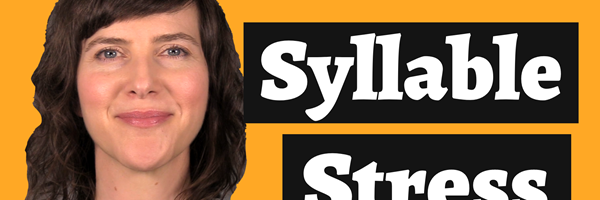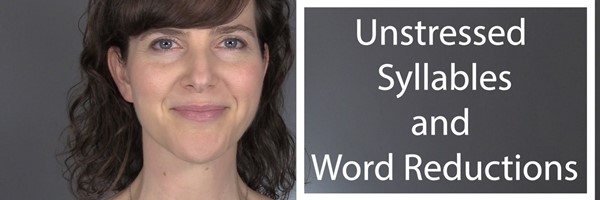In a previous video, I talked about syllable stress in American English. English is a stress-timed language, which means some syllables are stressed and some syllables are unstressed. Take for example the word conversation. This word is 4 syllables, and the third syllable SA /seɪ/ has the most stress.
If I said this word by giving each syllable the same amount of stress, like this, conversation - I’d sound robotic, and you would have a difficult time understanding me!
We can talk about syllables in an individual word being stressed, but spoken English is not only single words. When we speak, we talk in phrases and sentences, and we will stress words within that sentence to give the sentence a rhythm or a beat. And only the important words get the stress.
Listen to this sentence and see if you can hear which words are stressed more than the others:
I spoke to him yesterday. Listen again: I spoke to him yesterday.
Which words were stressed?
Spoke and yesterday. Could you hear it? Listen one more time, and I’ll say the sentence slowly: I spoke to him yesterday.
It’s sometimes helpful to use the syllables DA-da in place of the actual words when you’re listening for stress. DA is for stressed syllables, and da is for unstressed syllables. So I’ll say the sentence again, using DA-da: I spoke to him yesterday, da-DA-da-da-DA-da-da.
In spoken English, we stress the content words of a sentence - the words that provide the most meaning. Content words include nouns, main verbs, adjectives, adverbs, and wh-words like who, what, where, when, and why.
In the sentence I spoke to him yesterday, spoke is the main verb, and yesterday is an adverb.
Listen to another sentence and see if you can hear the words that are stressed:
Let’s go - I’m getting hungry! Let’s go - I’m getting hungry! da-DA! da-da-da-DA-da!
The words go and hungry are stressed. Go is a main verb, and hungry is an adjective.
One more:
The kids are playing at the park. The kids are playing at the park. da-DA-da-DA-da-da-da-DA.
The words kids, playing, and park are stressed. Kids is a noun, playing is a main verb, and park is a noun.
Thanks for watching! And I'd love to hear from you - contact me to learn how we can work together to perfect your American English pronunciation!
******************************************************************************************************
Interested in more American English pronunciation practice? Be sure to check out some of my most popular online resources (all free!):
- Dark L and Light L exercises: Free, downloadable and printable pdf
- Semi-Occluded Vocal Tract (SOVT) exercises: Free, downloadable and printable pdf
- Stressed and Unstressed Syllables exercises: Free, downloadable and printable pdf
- AH /ɑ/ and UH /ʌ/ Vowel pronunciation exercises: Free, downloadable and printable pdf
- American R /ɹ/ Consonant pronunciation exercises: Free, downloadable and printable pdf
- Vowel to Vowel Linking exercises: Free, downloadable and printable pdf
- Consonant to Vowel Linking exercises: Free, downloadable and printable pdf
- Word Reductions and English Rhythm exercises: Free, downloadable and printable pdf
- N /n/ and NG /ŋ/ Consonant pronunciation exercises: Free, downloadable and printable pdf
- Respiratory and Breath Support exercises: Free, downloadable and printable pdf
- International Phonetic Alphabet (IPA) for English Vowels: Free, downloadable and printable pdf
- International Phonetic Alphabet (IPA) for English Consonants: Free, downloadable and printable pdf
- Resonatory and Vocal Projection exercises: Free, downloadable and printable pdf
- Articulatory and Tongue Twister exercises: Free, downloadable and printable pdf
- Glottal Stop T /ʔ/, Flap T /ɾ/, and True T /t/ exercises: Free, downloadable and printable pdf
- EE /i/ and IH /ɪ/ Vowel pronunciation exercises: Free, downloadable and printable pdf
- Presentation Skills Training exercises: Free, downloadable and printable pdf
- Sentence-level Stress and Content Word Stress exercises: Free, downloadable and printable pdf



